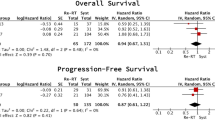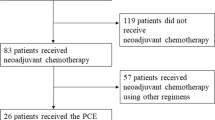Abstract
Purpose
To investigate the efficacy of chemotherapy among intermediate-risk (stage II/T3N0) nasopharyngeal carcinoma (NPC) patients receiving radiotherapy (RT).
Methods
We identified stage II/T3N0 NPC patients who received radiotherapy with or without chemotherapy from the Surveillance, Epidemiology and End Results database (2004–2019). Overall survival (OS) and cancer-specific survival (CSS) were assessed using the Kaplan–Meier method with log-rank test and Cox proportional hazards models to evaluate the efficacy of chemotherapy. Subgroup analysis was also conducted based on the baseline characteristics. Propensity score matching (PSM) was performed to balance the intergroup covariates.
Results
A total of 1623 patients were enrolled in the study, 1444 received chemoradiotherapy (CRT) and 179 received RT alone. CRT, compared to RT alone, was independently associated with a better OS (HR 0.57, 95% CI 0.45–0.71) and CSS (HR 0.55, 95% CI 0.39–0.79). After PSM, similar results were obtained, and CRT was superior to RT alone in terms of OS (HR 0.60, 95% CI 0.39–0.92) and CSS (HR 0.60, 95% CI 0.40–0.91). Subgroup analysis revealed that OS benefits from CRT were mainly observed in T0-2N1(HR 0.51, 95% CI 0.38–0.70) and T3N0 (HR 0.64, 95% CI 0.42–0.98) rather than T2N0 (HR 1.00, 95% CI 0.51–1.94). Interestingly, after PSM, OS benefits were still seen in T0-2N1 (HR 0.44, 95% CI 0.24–0.82), while not seen in T2N0 (HR 1.83, 95% CI 0.56–5.97) and T3N0 (HR 0.56, 95% CI 0.28–1.12).
Conclusion
For T0-2N1 NPC patients, CRT was superior to RT alone with better survival, whereas, for T2-3N0 patients, CRT was comparable to RT alone. Prospective large studies should be encouraged to verify the results.




Similar content being viewed by others
References
Bray F, Ferlay J, Soerjomataram I et al (2018) Global cancer statistics 2018: GLOBOCAN estimates of incidence and mortality worldwide for 36 cancers in 185 countries. CA Cancer J Clin 68:394–424
Wee JT, Ha TC, Loong SL et al (2010) Is nasopharyngeal cancer really a “Cantonese cancer”? Chin J Cancer 29:517–526
Yang XL, Wang Y, Liang SB et al (2018) Comparison of the seventh and eighth editions of the UICC/AJCC staging system for nasopharyngeal carcinoma: analysis of 1317 patients treated with intensity-modulated radiotherapy at two centers. BMC Cancer 18:606
Lin YH, Huang TL, Chien CY et al (2018) Pretreatment prognostic factors of survival and late toxicities for patients with nasopharyngeal carcinoma treated by simultaneous integrated boost intensity-modulated radiotherapy. Radiat Oncol 13:45
Zhang Y, Chen L, Hu GQ et al (2019) Gemcitabine and cisplatin induction chemotherapy in nasopharyngeal carcinoma. N Engl J Med 381:1124–1135
Bongiovanni A, Vagheggini A, Fausti V et al (2021) Induction chemotherapy plus concomitant chemoradiotherapy in nasopharyngeal carcinoma: an updated network meta-analysis. Crit Rev Oncol Hematol 160:103244
Verma V, Ryckman JM, Simone CB 2nd et al (2018) Patterns of care and outcomes with the addition of chemotherapy to radiation therapy for stage I nasopharyngeal cancer. Acta Oncol 57:257–261
Huang X, Chen X, Zhao C et al (2020) Adding concurrent chemotherapy to intensity-modulated radiotherapy does not improve treatment outcomes for stage II nasopharyngeal carcinoma: a phase 2 multicenter clinical trial. Front Oncol 10:1314
Li XY, Chen QY, Sun XS et al (2019) Ten-year outcomes of survival and toxicity for a phase III randomised trial of concurrent chemoradiotherapy versus radiotherapy alone in stage II nasopharyngeal carcinoma. Eur J Cancer 110:24–31
Ahmed Z, Kujtan L, Kennedy K et al (2019) The role of chemotherapy in the treatment of stage II nasopharyngeal carcinoma: Retrospective analysis of the national cancer database. Cancer Med 8:1500–1507
Wu P, Zhao Y, Xiang L et al (2020) Management of chemotherapy for stage II nasopharyngeal carcinoma in the intensity-modulated radiotherapy era: a review. Cancer Manag Res 12:957–963
Chen FP, Lin L, Liang JH et al (2021) Development of a risk classification system combining TN-categories and circulating EBV DNA for non-metastatic NPC in 10,149 endemic cases. Ther Adv Med Oncol 13:17588359211052416
Guo R, Tang LL, Mao YP et al (2019) Proposed modifications and incorporation of plasma Epstein-Barr virus DNA improve the TNM staging system for Epstein-Barr virus-related nasopharyngeal carcinoma. Cancer 125:79–89
Wang L, Wu Z, Cheng W et al (2021) Efficacy of concurrent chemoradiotherapy in subgroups of stage III nasopharyngeal carcinoma: an analysis based on 10-year follow-up. Radiat Oncol 16:215
Al-Sarraf M, LeBlanc M, Giri PG et al (1998) Chemoradiotherapy versus radiotherapy in patients with advanced nasopharyngeal cancer: phase III randomized Intergroup study 0099. J Clin Oncol 16:1310–1317
Chen Y, Sun Y, Liang SB et al (2013) Progress report of a randomized trial comparing long-term survival and late toxicity of concurrent chemoradiotherapy with adjuvant chemotherapy versus radiotherapy alone in patients with stage III to IVB nasopharyngeal carcinoma from endemic regions of China. Cancer 119:2230–2238
Lee AW, Tung SY, Chan AT et al (2011) A randomized trial on addition of concurrent-adjuvant chemotherapy and/or accelerated fractionation for locally-advanced nasopharyngeal carcinoma. Radiother Oncol 98:15–22
Lee AWM, Tung SY, Ng WT et al (2017) A multicenter, phase 3, randomized trial of concurrent chemoradiotherapy plus adjuvant chemotherapy versus radiotherapy alone in patients with regionally advanced nasopharyngeal carcinoma: 10-year outcomes for efficacy and toxicity. Cancer 123:4147–4157
Sun XS, Chen WH, Liu SL et al (2019) Individualized concurrent chemotherapy by pretreatment plasma Epstein-Barr viral DNA in II-III stage nasopharyngeal carcinoma: a propensity score matching analysis using a large cohort. Cancer Med 8:4214–4225
Sun XS, Li XY, Xiao BB et al (2020) Establishment and validation of a nomogram for predicting the benefit of concurrent chemotherapy in stage II nasopharyngeal carcinoma: a study based on a phase III randomized clinical trial with 10-year follow-up. Oral Oncol 100:104490
Aftab O, Liao S, Zhang R et al (2020) Efficacy and safety of intensity-modulated radiotherapy alone versus intensity-modulated radiotherapy plus chemotherapy for treatment of intermediate-risk nasopharyngeal carcinoma. Radiat Oncol 15:66
Zhang F, Zhang Y, Li WF et al (2015) Efficacy of concurrent chemotherapy for intermediate risk NPC in the intensity-modulated radiotherapy era: a propensity-matched analysis. Sci Rep 5:17378
Zhang LN, Gao YH, Lan XW et al (2015) Propensity score matching analysis of cisplatin-based concurrent chemotherapy in low risk nasopharyngeal carcinoma in the intensity-modulated radiotherapy era. Oncotarget 6:44019–44029
Wang X, Wang Z, Chen Y et al (2022) Impact of prior cancer on the overall survival of patients with nasopharyngeal carcinoma. Am J Otolaryngol 43:103235
Sze HC, Ng WT, Chan OS et al (2012) Radical radiotherapy for nasopharyngeal carcinoma in elderly patients: the importance of co-morbidity assessment. Oral Oncol 48:162–167
Mi JL, Meng YL, Wu HL et al (2020) Comparison of intensity-modulated radiation therapy alone vs. intensity-modulated radiation therapy combined with chemotherapy in elderly nasopharyngeal carcinoma patients (aged >65 years). Strahlenther Onkol 196:270–279
Verma V, Surkar SM, Moreno AC et al (2018) Practice patterns and outcomes of chemoradiotherapy versus radiotherapy alone for older patients with nasopharyngeal cancer. Cancer Med 7:1604–1611
Zeng Q, Xiang YQ, Wu PH et al (2015) A matched cohort study of standard chemo-radiotherapy versus radiotherapy alone in elderly nasopharyngeal carcinoma patients. PLoS ONE 10:e0119593
Ng AWY, Tung SY, Cheung AKW et al (2015) No role of using chemoradiation in T2N0 and T1N1 with small lymph node size stage II nasopharyngeal carcinoma. Int J Radiat Oncol Biol Phys 93:E306–E307
Chen S, Yang D, Liao X et al (2021) Failure patterns of recurrence and metastasis after intensity-modulated radiotherapy in patients with nasopharyngeal carcinoma: results of a multicentric clinical study. Front Oncol 11:693199
Cao C, Xu Y, Huang S et al (2021) Locoregional extension patterns of nasopharyngeal carcinoma detected by FDG PET/MR. Front Oncol 11:763114
Zhao Y, Liao X, Wang Y et al (2022) Level Ib CTV delineation in nasopharyngeal carcinoma based on lymph node distribution and topographic anatomy. Radiother Oncol 172:10–17
Mao Y, Wang S, Lydiatt W et al (2021) Unambiguous advanced radiologic extranodal extension determined by MRI predicts worse outcomes in nasopharyngeal carcinoma: potential improvement for future editions of N category systems. Radiother Oncol 157:114–121
Tsai TY, Chou YC, Lu YA et al (2021) The prognostic value of radiologic extranodal extension in nasopharyngeal carcinoma: Systematic review and meta-analysis. Oral Oncol 122:105518
Hu Y, Lu T, Huang SH et al (2019) High-grade radiologic extra-nodal extension predicts distant metastasis in stage II nasopharyngeal carcinoma. Head Neck 41:3317–3327
Lu T, Hu Y, Xiao Y et al (2019) Prognostic value of radiologic extranodal extension and its potential role in future N classification for nasopharyngeal carcinoma. Oral Oncol 99:104438
Chin O, Yu E, O’Sullivan B et al (2021) Prognostic importance of radiologic extranodal extension in nasopharyngeal carcinoma treated in a Canadian cohort. Radiother Oncol 165:94–102
Zhang W, Chen Y, Chen L et al (2015) The clinical utility of plasma Epstein-Barr virus DNA assays in nasopharyngeal carcinoma: the dawn of a new era?: a systematic review and meta-analysis of 7836 cases. Medicine (Baltimore) 94:e845
Kim KY, Le QT, Yom SS et al (2017) Clinical Utility of Epstein-Barr virus DNA testing in the treatment of nasopharyngeal carcinoma patients. Int J Radiat Oncol Biol Phys 98:996–1001
Chan AT, Lo YM, Zee B et al (2002) Plasma Epstein-Barr virus DNA and residual disease after radiotherapy for undifferentiated nasopharyngeal carcinoma. J Natl Cancer Inst 94:1614–1619
Tang SQ, Chen L, Li WF et al (2021) Identifying optimal clinical trial candidates for locoregionally advanced nasopharyngeal carcinoma: analysis of 9468 real-world cases and validation by two phase 3 multicentre, randomised controlled trial. Radiother Oncol 167:179–186
Liang H, Lv X, Wang L et al (2018) The plasma Epstein-Barr virus DNA level guides precision treatment for nasopharyngeal carcinoma in the intensity-modulated radiotherapy era: a large population-based cohort study from an endemic area. Ther Adv Med Oncol 10:1758835918782331
Lee AWM, Lee VHF, Ng WT et al (2021) A systematic review and recommendations on the use of plasma EBV DNA for nasopharyngeal carcinoma. Eur J Cancer 153:109–122
Funding
The author(s) received no specific funding for this work.
Author information
Authors and Affiliations
Corresponding author
Ethics declarations
Conflict of interest
The authors report no conflicts of interest in this work.
Additional information
Publisher's Note
Springer Nature remains neutral with regard to jurisdictional claims in published maps and institutional affiliations.
Rights and permissions
Springer Nature or its licensor (e.g. a society or other partner) holds exclusive rights to this article under a publishing agreement with the author(s) or other rightsholder(s); author self-archiving of the accepted manuscript version of this article is solely governed by the terms of such publishing agreement and applicable law.
About this article
Cite this article
Xu, YC., Chen, KH., Liang, ZG. et al. Long-term outcomes of chemoradiotherapy versus radiotherapy alone in patients with intermediate-risk nasopharyngeal carcinoma: a population-based analysis. Eur Arch Otorhinolaryngol 280, 1793–1802 (2023). https://doi.org/10.1007/s00405-022-07726-8
Received:
Accepted:
Published:
Issue Date:
DOI: https://doi.org/10.1007/s00405-022-07726-8




